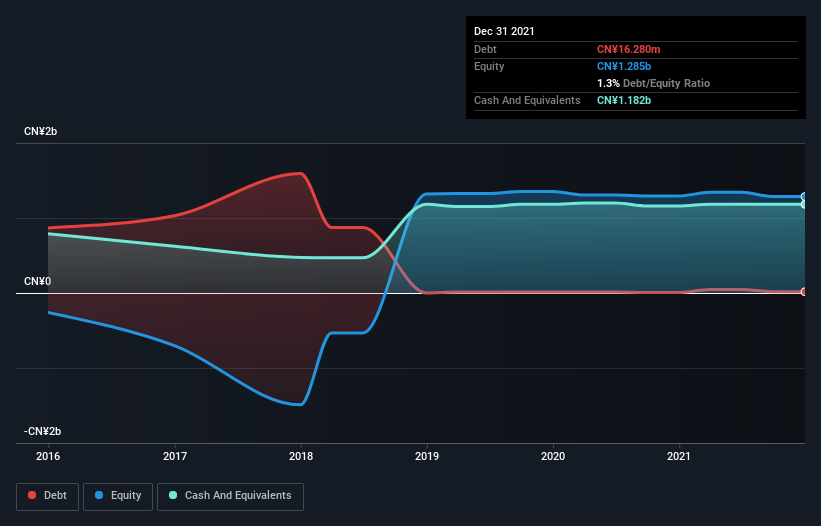- Hong Kong
- /
- Consumer Services
- /
- SEHK:1739
Does Qeeka Home (Cayman) (HKG:1739) Have A Healthy Balance Sheet?
Legendary fund manager Li Lu (who Charlie Munger backed) once said, 'The biggest investment risk is not the volatility of prices, but whether you will suffer a permanent loss of capital.' So it might be obvious that you need to consider debt, when you think about how risky any given stock is, because too much debt can sink a company. We can see that Qeeka Home (Cayman) Inc. (HKG:1739) does use debt in its business. But is this debt a concern to shareholders?
When Is Debt Dangerous?
Debt assists a business until the business has trouble paying it off, either with new capital or with free cash flow. Ultimately, if the company can't fulfill its legal obligations to repay debt, shareholders could walk away with nothing. However, a more common (but still painful) scenario is that it has to raise new equity capital at a low price, thus permanently diluting shareholders. Of course, the upside of debt is that it often represents cheap capital, especially when it replaces dilution in a company with the ability to reinvest at high rates of return. The first thing to do when considering how much debt a business uses is to look at its cash and debt together.
See our latest analysis for Qeeka Home (Cayman)
What Is Qeeka Home (Cayman)'s Net Debt?
The image below, which you can click on for greater detail, shows that at December 2021 Qeeka Home (Cayman) had debt of CN¥16.3m, up from CN¥7.00m in one year. However, it does have CN¥1.18b in cash offsetting this, leading to net cash of CN¥1.17b.

How Strong Is Qeeka Home (Cayman)'s Balance Sheet?
The latest balance sheet data shows that Qeeka Home (Cayman) had liabilities of CN¥817.3m due within a year, and liabilities of CN¥22.0m falling due after that. Offsetting these obligations, it had cash of CN¥1.18b as well as receivables valued at CN¥455.3m due within 12 months. So it actually has CN¥798.4m more liquid assets than total liabilities.
This luscious liquidity implies that Qeeka Home (Cayman)'s balance sheet is sturdy like a giant sequoia tree. With this in mind one could posit that its balance sheet means the company is able to handle some adversity. Simply put, the fact that Qeeka Home (Cayman) has more cash than debt is arguably a good indication that it can manage its debt safely. When analysing debt levels, the balance sheet is the obvious place to start. But you can't view debt in total isolation; since Qeeka Home (Cayman) will need earnings to service that debt. So when considering debt, it's definitely worth looking at the earnings trend. Click here for an interactive snapshot.
Over 12 months, Qeeka Home (Cayman) reported revenue of CN¥1.1b, which is a gain of 21%, although it did not report any earnings before interest and tax. With any luck the company will be able to grow its way to profitability.
So How Risky Is Qeeka Home (Cayman)?
While Qeeka Home (Cayman) lost money on an earnings before interest and tax (EBIT) level, it actually booked a paper profit of CN¥74m. So taking that on face value, and considering the cash, we don't think its very risky in the near term. Given it also grew revenue by 21% over the last year, we think there's a good chance the company is on track. That growth could mean this is one stock well worth watching. There's no doubt that we learn most about debt from the balance sheet. But ultimately, every company can contain risks that exist outside of the balance sheet. For example - Qeeka Home (Cayman) has 4 warning signs we think you should be aware of.
If, after all that, you're more interested in a fast growing company with a rock-solid balance sheet, then check out our list of net cash growth stocks without delay.
Valuation is complex, but we're here to simplify it.
Discover if Qeeka Home (Cayman) might be undervalued or overvalued with our detailed analysis, featuring fair value estimates, potential risks, dividends, insider trades, and its financial condition.
Access Free AnalysisHave feedback on this article? Concerned about the content? Get in touch with us directly. Alternatively, email editorial-team (at) simplywallst.com.
This article by Simply Wall St is general in nature. We provide commentary based on historical data and analyst forecasts only using an unbiased methodology and our articles are not intended to be financial advice. It does not constitute a recommendation to buy or sell any stock, and does not take account of your objectives, or your financial situation. We aim to bring you long-term focused analysis driven by fundamental data. Note that our analysis may not factor in the latest price-sensitive company announcements or qualitative material. Simply Wall St has no position in any stocks mentioned.
About SEHK:1739
Qeeka Home (Cayman)
Operates online interior design and construction platform in the People’s Republic of China.
Excellent balance sheet and good value.
Market Insights
Community Narratives



